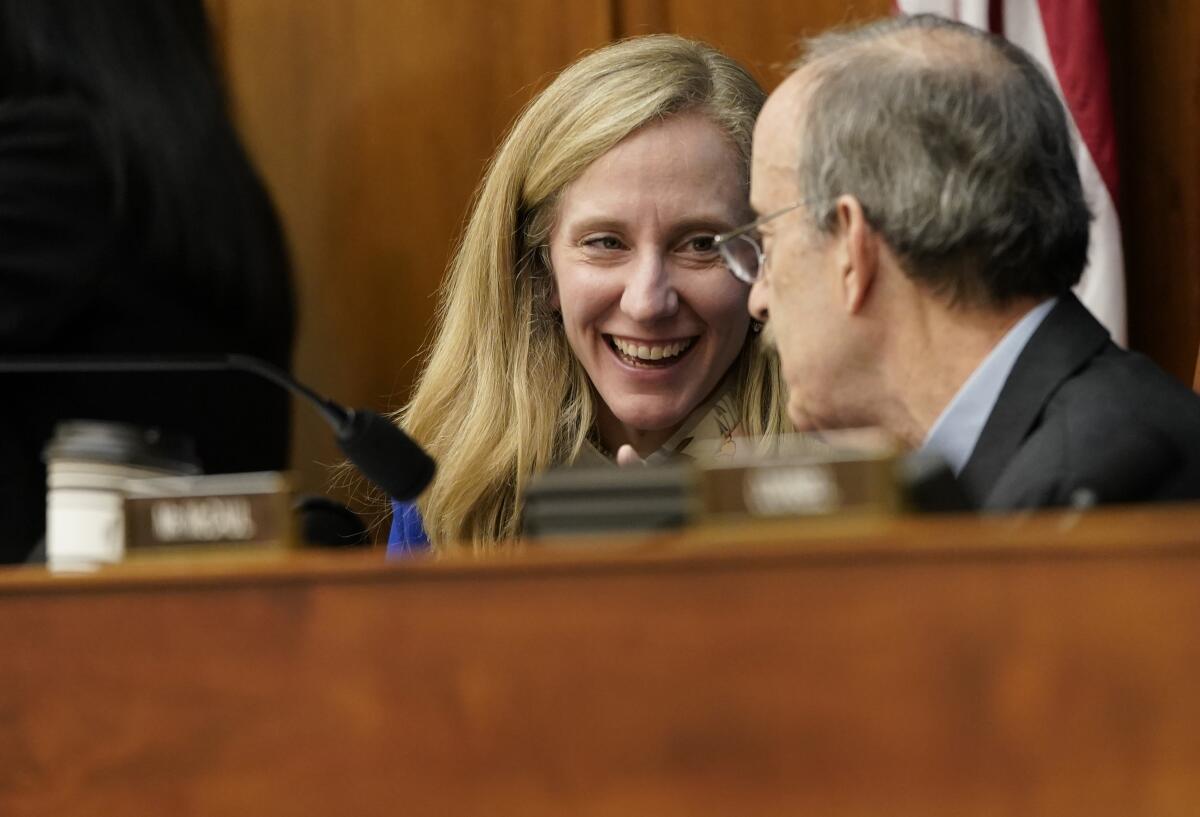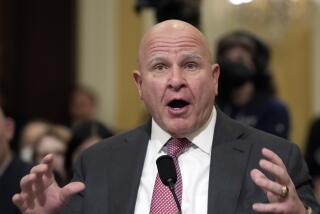National security experts in both parties will face pressure over their impeachment votes

- Share via
WASHINGTON — Her yes votes for President Trump’s impeachment could leave former CIA case officer Rep. Abigail Spanberger, a Democrat from a swing district in Virginia, politically vulnerable.
His no votes could leave fellow former CIA undercover officer Rep. Will Hurd, a Republican from Texas, open to criticism about his own credibility on national security, the credential he hopes to rely on for any future run for higher office.
Spanberger cited her intelligence work on the House floor on Wednesday as she explained her support for impeachment.
“Foreign nationals risked imprisonment, often their very lives, to help us, inform us — but why?” Spanberger said. “It was their belief in the United States … a democratic republic founded on a document and a belief in the rule of law.”
Hurd similarly highlighted his national security background when he criticized Trump’s actions regarding Ukraine, which he said were improper, although not worthy of impeachment.
“Throughout this process, Americans have learned of bungling foreign policy decisions,” Hurd said. “But we have not heard evidence beyond a reasonable doubt of bribery or extortion.”
The ultimate political consequences from impeachment may not be clear until ballots are counted in November. But it is likely to have the biggest impact in congressional districts that switched in 2018 from a Republican lawmaker to a Democratic one — many of whom leveraged their national security credentials.
Several of the Democratic national security freshman members of the House played a key role in getting the impeachment process started, writing a joint op-ed article in September that said Trump’s actions merited an impeachment investigation.
Since then, they’ve become Republican targets.
When Spanberger announced her intent to support impeachment, White House Deputy Press Secretary Steven Groves said it was clear that “she is beholden to Nancy Pelosi and progressive Democrats, not Virginians.”
Rep. Elissa Slotkin (D-Mich.), a former CIA analyst and Defense Department official, also drew attacks from Republicans for her impeachment stance. Her Michigan district went for Trump by nearly 7 points in 2016.
Slotkin acknowledged the tough race she faces during a town hall earlier this week in which she announced that she intended to vote for the impeachment articles, to some heckles from the crowd.
“I can hear that this is a very controversial decision — and I knew that,” she said. “I hope you believe me when I tell you that I made this decision out of principle.”
Rep. Tom Malinowski (D-N.J.), a former Obama State Department official who also defeated a Republican incumbent, appealed to GOP colleagues who he suggested had expressed disapproval of the president — privately.
If Congress doesn’t impeach, adversaries “will know America’s foreign policy can be bought by doing the president ‘a favor,’” Malinowski said, alluding to Trump’s request in his July 25 telephone call to Ukrainian President Volodymyr Zelensky.
“Do not whisper that you disapprove and then defend that conduct here today.”
Few Republican elected officials, however, have publicly gone even as far as Hurd in criticizing Trump’s conduct of foreign policy.
Asked during a congressional briefing on Afghanistan and Pakistan whether leaders of those countries had expressed concern about Trump’s unpredictable behavior, Sen. Lindsey Graham (R-S.C.), a Trump ally, conceded some worries.
“Well, to me, predictability is important,” he said. He pointed to the effects of the president’s announcements of withdrawals from Syria and Afghanistan, which caught him and other national security advisors by surprise.
“To say otherwise would be naive,” he added.
Sen. John Thune (R-S.D.), the majority whip, said Trump’s supporters understood when they elected him that he would have “a less conventional style of dealing with foreign affairs and national security issues, and I frankly think in most respects that’s probably true.”
Thune said the president is eager to defend himself in the Senate trial. But he declined to defend Trump’s foreign policy or actions toward Ukraine.
“Well,” he said with a sigh, “that’s probably a discussion for another day.”
Not a day like today?
“I support making sure we are helping in every way possible for Ukraine to defend itself against Russian incursion,” he said. “The threat in that region in the world obviously is Russia.”
More to Read
Get the L.A. Times Politics newsletter
Deeply reported insights into legislation, politics and policy from Sacramento, Washington and beyond. In your inbox twice per week.
You may occasionally receive promotional content from the Los Angeles Times.











